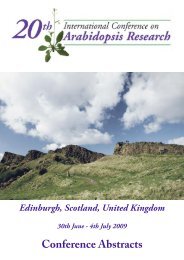Edinburgh, Scotland, United Kingdom - TAIR
Edinburgh, Scotland, United Kingdom - TAIR
Edinburgh, Scotland, United Kingdom - TAIR
You also want an ePaper? Increase the reach of your titles
YUMPU automatically turns print PDFs into web optimized ePapers that Google loves.
Control of perennial flowering and perenniality<br />
in Arabis alpina<br />
Annual plants complete their life cycle in one year and initiate flowering only<br />
once, whereas perennials live for many years and flower repeatedly. Perenniality<br />
of higher perennial plants is closely related to their specific flowering behaviours.<br />
Although the molecular mechanism of flowering-time control has been<br />
extensively studied in annual Arabidopsis thaliana, little is known in perennials.<br />
We have developed a perennial model Arabis alpina, which is a relative of<br />
A. thaliana, to study perennial specific flowering time control and perenniality<br />
related issues including seasonal flowering, juvenility and polycarpy. We<br />
identified the A. alpina mutant perpetual flowering 1 (pep1), and found that PEP1<br />
contributes to seasonal flowering by restricting flowering to spring and adds to<br />
polycarpic growth habit by preventing flowering in some branches. The pep1<br />
mutation is in the orthologue of the Arabidopsis FLC gene. In contrast to the<br />
stable epigenetic silencing of FLC caused by vernalisation, PEP1 is only<br />
transiently repressed by low temperatures, causing repeated seasonal cycles of<br />
repression and activation of PEP1 transcription that allow it to carry out functions<br />
characteristic of the cyclical life history of perennials. The patterns of chromatin<br />
modifications at FLC and PEP1 differ correlating with their distinct expression<br />
patterns. Thus we describe a critical mechanism by which flowering regulation<br />
differs between related perennial and annual species, and propose that<br />
differences in chromatin regulation contribute to this variation.<br />
56<br />
C05<br />
Wednesday 15:00 - 15:15<br />
Hot Topics<br />
Renhou Wang1<br />
Maria Albani1<br />
Sara Farrona1<br />
Coral Vincent1<br />
Anika Joecker1<br />
Heiko Schoof1<br />
Franziska Turck1<br />
Carlos Alonso-Blanco2<br />
George Coupland1<br />
1Max Planck Institute for<br />
Plant Breeding Research<br />
Cologne<br />
Germany<br />
2Centro Nacional de<br />
Biotecnologia<br />
Madrid<br />
Spain




